How to become a professional wrestler
- Published
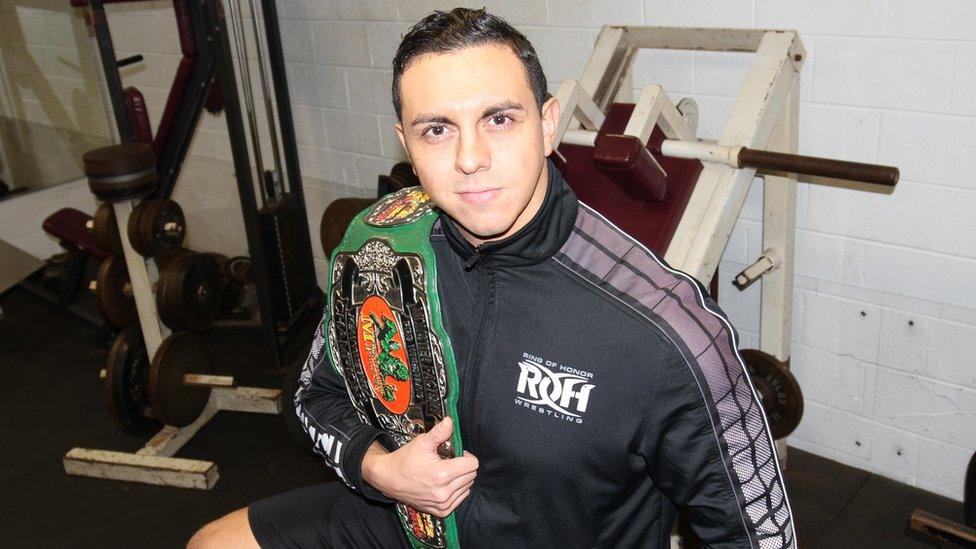
Giovanni Forero - also known by his ring name, LSG - is the Monster Factory champion
In a small New Jersey town, young men and women dream of becoming the next wrestling superstar.
By night, Gabriella Belpre flies through the air, bounces off steel ropes, and slams women into wooden floors.
By day, she's earthbound. The 23-year-old is executive assistant to the Mayor of Philadelphia.
Though she loves her job - "The mayor's a big wrestling fan" - she has bigger plans.
Gabby dreams of becoming a professional wrestler. And here, in a hall on the edge of a blue-collar New Jersey town, is where the dream begins.

Gabby, from Philadelphia, was born into a family of wrestling fans. Her dad had a cardboard cut-out of Stone Cold Steve Austin; her mum wore a trench coat like the Undertaker.
In January 2015 the Royal Rumble came to town, so Gabby went to a meet-and-greet beforehand.
The Rumble is a WWE event - World Wrestling Entertainment is the biggest name in the business - so Gabby hoped to see a wrestler, take a picture, and bask in their glow.
It was there, waiting for the stardust to fall, that her life changed. "I just looked round and thought 'I'm bigger than this'," she says.
"I saw the fans, saw how they were reacting. I thought: I want to be the person who everyone is meeting."
Gabby went to arts school, so wrestling wasn't a huge leap. "I thought wrestling was less athletic, and more performance art," she says.
She researched wrestling schools - there are dozens in the north-eastern United States - and settled on the Monster Factory in Paulsboro, a town of 6,000 people.
The school insists on a try-out, so Gabby went along with her dad. When she walked in, the coach, Danny Cage, had a warning.
"He said, the next day, I'd feel like I'd been hit by a truck," she says.
While wrestling is scripted, you can't fake a body-slam. When your back hits the mat, it hurts: the only protection is a thin layer of barely-there foam.
Gabby is small - 5ft 1in, 110lbs - but Danny liked what he saw. She was in. There was, however, one problem.
"The next day," she says, "I couldn't get my head off the pillow."
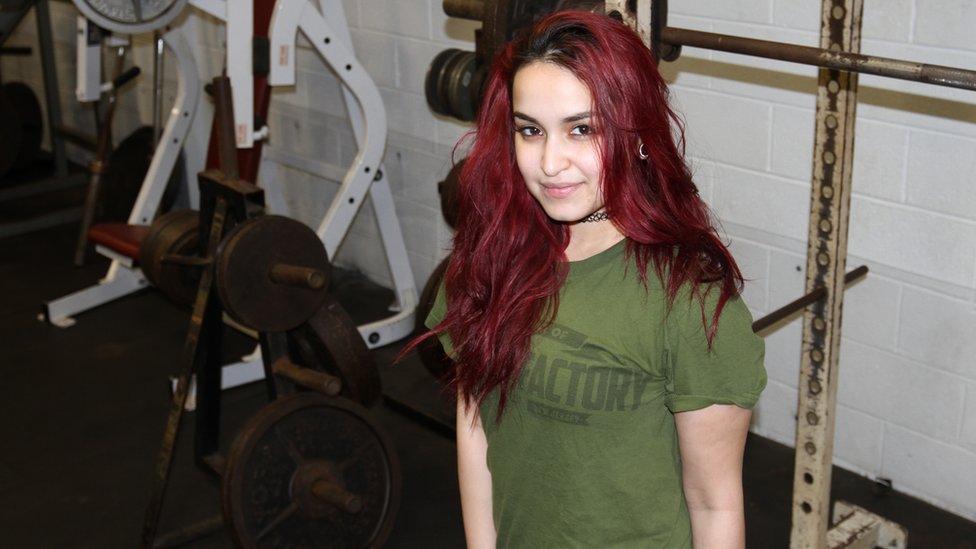
Gabriella Belpre: "I get terrified before matches. I dry-heave."
The Monster Factory opened in 1983, and has produced a number of WWE stars, including Sheamus, the Big Show, and - further back - Bam Bam Bigelow and Tatanka.
Coach Danny, 44, took over in 2011. He charges $4,000 [£2,900] for lifetime membership, or $3,500 up front.
Training is held three nights a week, with an optional session on Sundays. They hold a show once a month, and the rings - and the wrestlers - are also hired out for birthday parties.
On a cold Tuesday night, 30 wrestlers show up for training. They look like a regiment: polite, professional, most wearing military-green Monster Factory t-shirts.
Ages range from 17 to 37. There are six women, and body shapes vary. Some are tall, muscular, and ready for a magazine cover. But most look normal.
"I would rather have someone that wants to listen, and do everything we say, against someone who looks tremendous but can't be coached," says Danny.
On a weekday, doors open at 7pm, so the students can do gym work, before training starts at 8. They must stay until at least 10.30.
The session begins with warm-ups - the students run and roll until their T-shirts turn dark with sweat - before the group splits in two.
In one ring, the experienced wrestlers perfect their slams and suplexes. In another, newcomers work on the basics: lock-ups [the opening grapple], bumps [falls], and bouncing off ropes.
Danny rarely yells - "I might talk sternly," he says - but he demands effort. "People have said to me 'I am paying you - you don't get to talk like that.'
"I'm like, 'I'm not your waiter. I'm not painting your house. I am your coach - you do what I say.'"
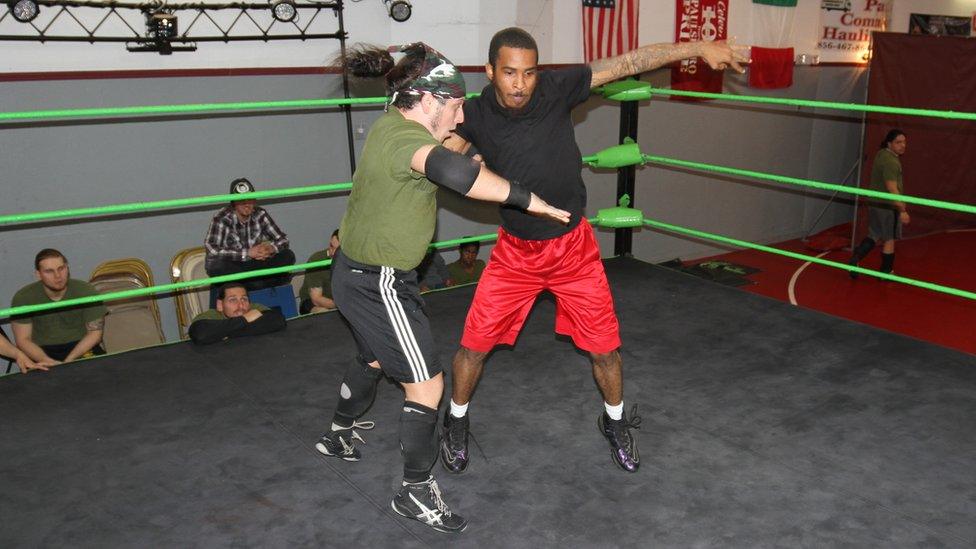
Bender and Cheech train at the Monster Factory
Three or four times a week, Giovanni Forero drives 82 miles from his home in Rahway, New Jersey, to train at the Monster Factory.
The 28-year-old has a communications degree and works for a web design company, but longs to become a WWE star. The film-star looks won't hurt.
Giovanni started wrestling in 2010, and has been at the Monster Factory for five years. His first match, in March 2011, was at his old high school.
"All my friends, family, and high school teachers were there," he says. "It was horrible."
Once wrestlers have mastered the basics, they need matches to sharpen their skills. Most take place in gyms, or warehouses, in front of small crowds.
"When you're starting, you're hunting for work," says Giovanni. "You're contacting promoters; you're sending footage, pictures, résumés."
But - when your reputation grows - the promoters contact you.
Giovanni, aka LSG, external, is the Monster Factory champion, and wrestles for Ring of Honor, a company that broadcasts nationwide. He also works for other promotions across the north-eastern United States.
"There's a lot of money flowing into independent wrestling at the moment," he says.
"I see shows in the middle of the week that are selling out. You can work Thursday, Friday, Saturday, Sunday, if you want.
"You can even work multiple shows a day. That's tough, but you can do it. A lot of my friends make a living from it."
For now, though, Giovanni will keep his 9 to 5 - web designer by day, wrestler by night, trunks packed and ready to travel. Luckily, his girlfriend understands.
He and Gabriella Belpre have been a real-life couple for almost three years.
Giovanni - aka LSG - v Mikey Webb in a high-flying championship match. Chaz Williams and Fearon Burgundy commentate
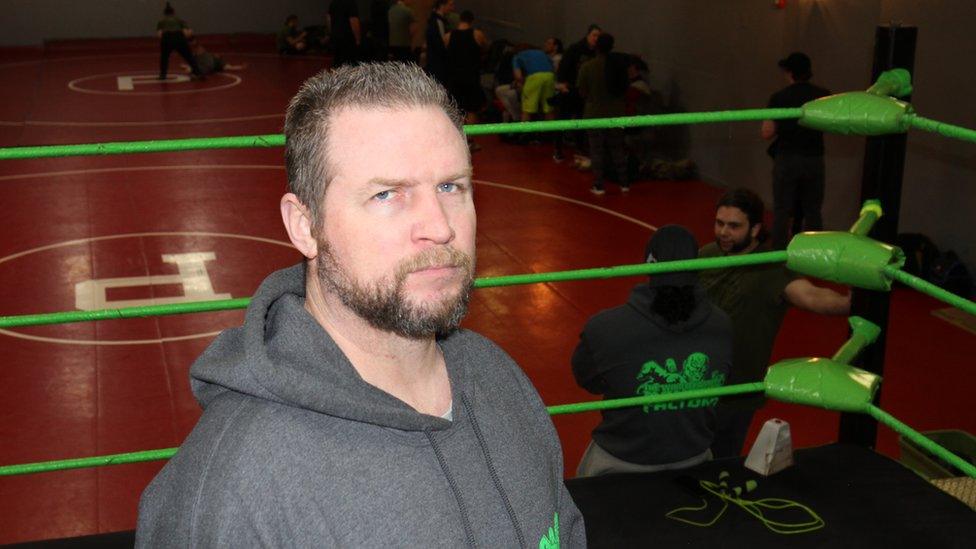
Danny Cage, owner and head coach at the Monster Factory
At the Monster Factory, the sound of body slams fills the air. When a back hits the mat, it cracks like gun fire.
But for Danny, the moves are a small part of wrestling. For him, it's really about story-telling.
"In script-writing, the first ten pages will decide if someone is going to keep reading," he says.
"I equate that to wrestling - the entrance, walking to the ring, getting in, locking up, that's your first ten pages.
"If you walk through the curtain, look like a sack of shit, and your lock-up is terrible, the audience just changed the dial."
During matches, story-telling requires tension, turning points, and letting the atmosphere build. "A good match is like a three-act play," says Danny.
Before matches, wrestlers must be able to "cut a promo". That means taking the microphone, addressing the crowd, and making them love you or hate you.
"WWE - and other places - have got away from those 80s-style promos," says Danny.
"You know, 'Let me tell you something brother, when we get into the squared circle, it's going to be me with my hand raised, 1-2-3!' Nobody cares about that.
"Now, it's more reality-based. You have to make a connection, tell a story, explain your struggle, say how you feel."
One of the Monster Factory's students, Lucas "Twitch" DiSangro, external, is nicknamed Veal, because he has "the muscle tone of a baby cow" (this, apparently, is not desirable).
But, says Danny, "if [WWE owner] Vince McMahon came in and asked someone to cut a promo, I would let two people talk - and one of them is Twitch".

Danny's top promo tips
Don't rock back and forth
Don't rub your hands - you will look nervous
Don't use clichés

The Monster Factory students, without exception, want to become WWE superstars. But their chances are slim.
The WWE employs around 100 wrestlers on its main roster, and around 50 others in NXT, its development programme.
(While salaries aren't revealed, NXT wrestlers are thought to earn around $60,000 / £43,000 a year. On the main roster, salaries start around $100,000 and climb into the millions).
Danny has good contacts: he knows the WWE talent scout Gerald Brisco, their director of talent development Canyon Ceman, and William Regal, the NXT general manager.
But, since taking over in 2011, only one of his students has reached the big-time: Steve Cutler, a former marine who did two tours of Afghanistan, is signed to NXT.
(Many others, like LSG, have made it from the Monster Factory to Ring of Honor, external, the nationally-broadcast challenger promotion).
Does Danny feel he is selling an impossible dream?
"If you train here - and do what's asked of you - not only will you have the best chance at a career, but you will also walk away a better person," he says.
"Not to mention a lifetime of great memories, knowing you dared to live your dream."
He also points out there are other jobs in wrestling, other than wrestling - "writing, coaching, producing, commentary, ref... tons of options".
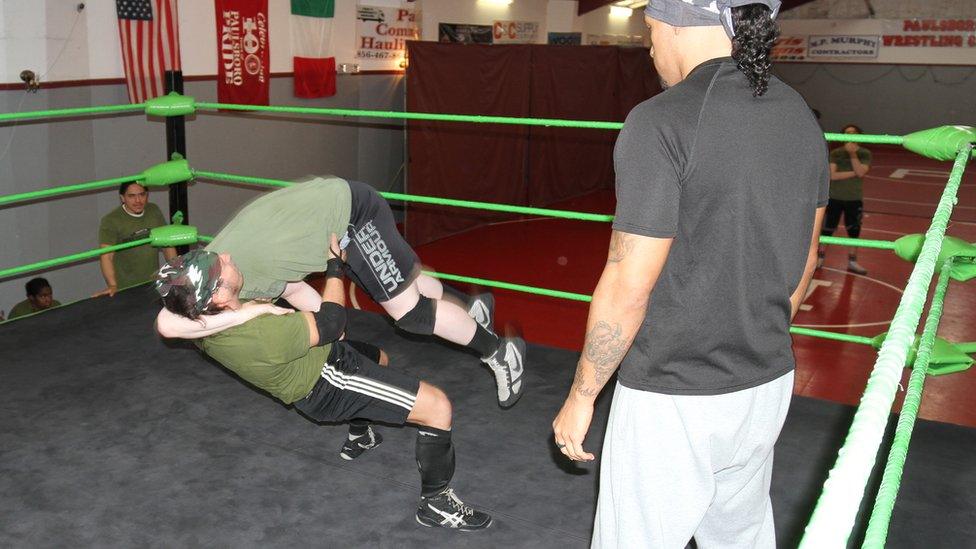
Dan Weverbee gets suplexed under the eye of coach Luis "Punishment" Martinez - who is also a Ring of Honor star
The WWE has try-outs every three or four months, with wrestlers coming from schools across the country.
Danny puts forward two wrestlers, and the company usually takes one. The assessments take place in Florida over three days.
Jaxon Stone, a 25-year-old with hands like snow shovels, external, is the next to try. "When I got the email from WWE, it was incredible," he says. "I thought it wasn't real."
Jaxon used to live in Dallas, Texas - 1,500 miles south-west of New Jersey - but moved north to boost his career and break new markets.
He has already wrestled across the US, across Europe, in Germany, and earns enough to pay the bills.
Although he has been a huge wrestling fan since childhood - "I probably had 150 videos, and every T-shirt you could think of," he says - his ambition used to be professional baseball.
He got a college scholarship, tried-out with the Atlanta Braves three times - and played with them briefly - before being let go. Now, then, he dreams of wrestling. Why?
"It's the combination of everything I've enjoyed throughout my life," he says. "Being in theatre, playing sports, being an entertainer. It all comes together when you're in the ring…"
He pauses.
"…and being famous, making lots of money, and having fans all over the world, is a great bonus."
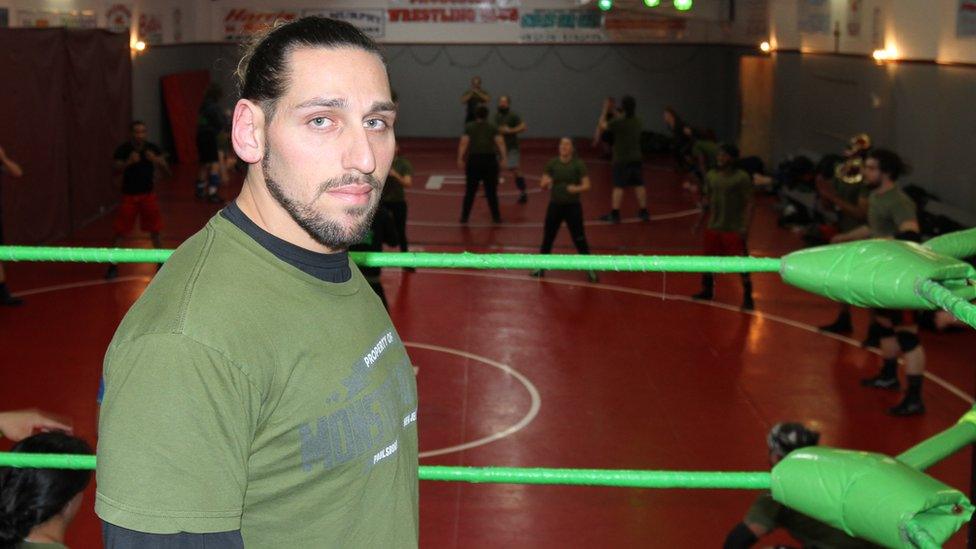
Jaxon Stone: "I became a fan in 2006 and I've been pretty much obsessed ever since."
Although most of Danny's students won't make the big-time - most won't even get a try-out - they will all have fun trying.
You wouldn't come here four times a week, bouncing between steel and wood, if you didn't enjoy it.
At City Hall, Gabby says that, at first, some of her colleagues "didn't understand" her passion. "I was like, 'Yeah, I wrestle after work, I can't go to Happy Hour'. They thought I was crazy."
But her hard work is paying off. Last year, she spent two months touring Japan with Stardom, the women's wrestling promotion, external, and has her heart set on WWE.
"I want to inspire people the way I've been inspired," she says. "And also, I want to have fun. It just looks like a ton of fun. Any time I get paid for wrestling, it shocks me.
"I'm like - 'How am I getting money for this? I'm having such a blast!'"
So, one day, the fans might queue to meet-and-greet Gabriella Belpre? "That's the dream, right there," she says.
Follow Owen Amos on Twitter @owenamos, external
- Attribution
- Published16 March 2015
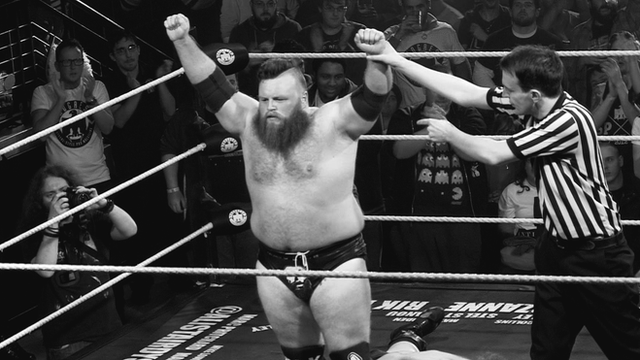
- Published8 February 2018
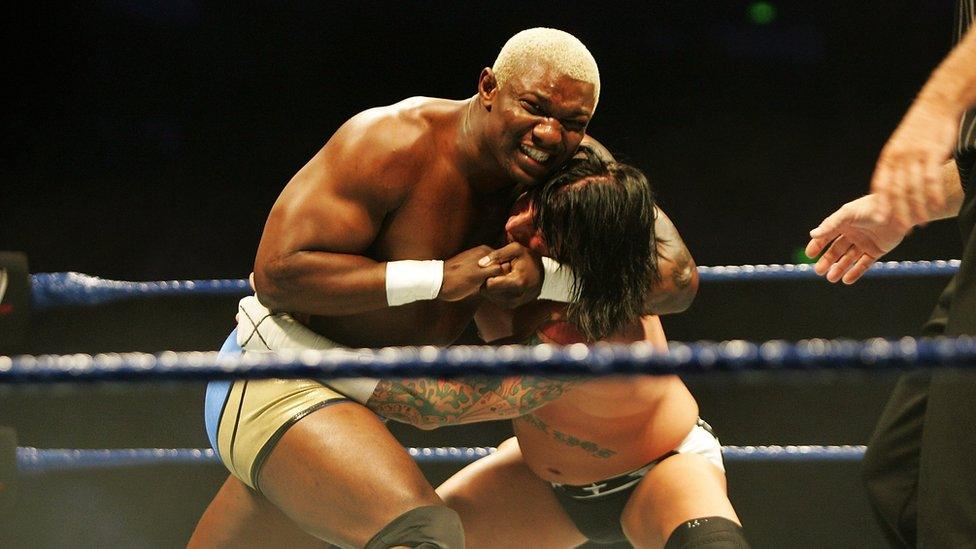
- Published13 January 2018